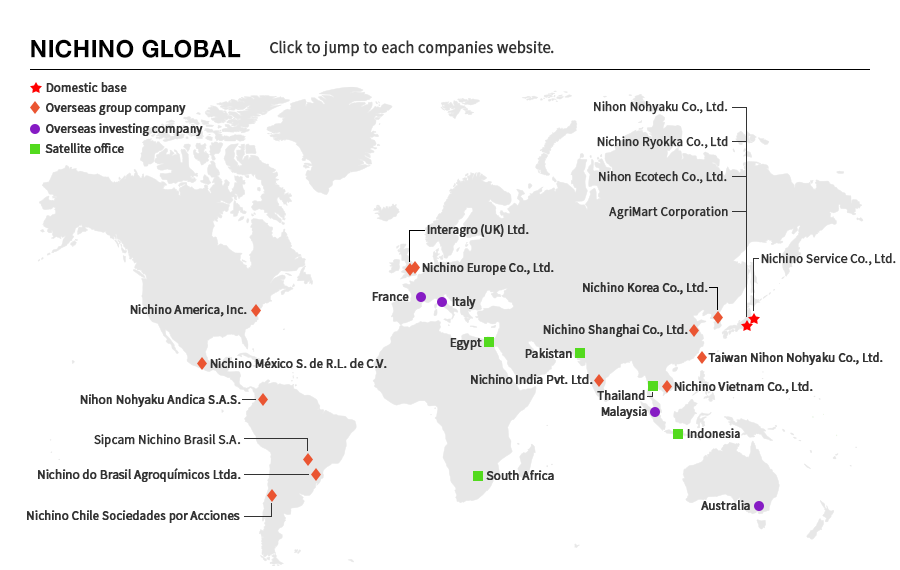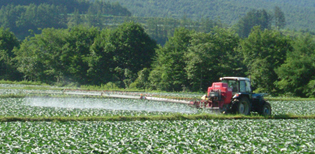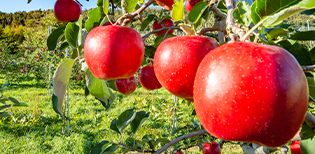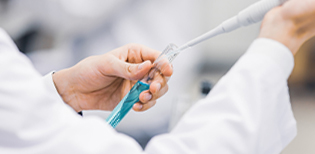SDGs of Nihon Nohyaku
- Initiatives toward SDGs
- Connections between the Seven Priority Sustainability Issues and the SDGs
- Raising Awareness of the SDGs, and the PDCA Cycle
- Putting the SDGs into Practice
Initiatives toward SDGs
[NICHINO Group’s Core Business and SDGs]
The SDGs were adopted at the United Nations Summit in September 2015 as the “2030 Agenda” related to sustainable human activity, and the “SDG Compass” was also established to garner the participation of companies. The SDGs can ultimately be interpreted as goals aimed at solving issues with a global reach, like poverty and the environment, through technological innovation.
The agrochemical business of the NICHINO Group is a business that has been aimed front and center at solving problems through “technological innovation” with consideration for “environmental conservation” in order to “overcome poverty and hunger,” which is central to the SDGs. The historical development of the agrochemical business can be seen as a series of efforts to achieve the SDGs.
Based on our recognition that the nature of the NICHINO Group’s business and its historical development are in line with the action principles of the SDGs, we surveyed initiatives being conducted by our business departments and Group companies and rendered this information visually in the form of an SDGs map. The map shows how the NICHINO Group is involved in many core issues of the SDGs through the products and technologies of the agrochemical business and related businesses.
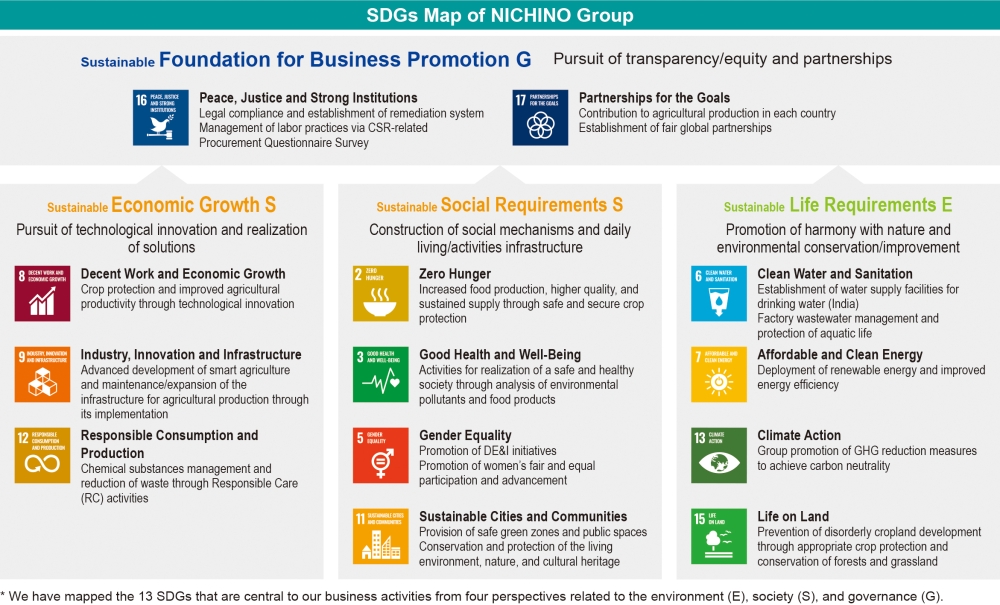
[Main Initiatives]
Here we introduce a number of SDGs that have a particularly deep relationship with the Group’s core business activities. These relate to “sustainable development initiatives that harness technological innovation to simultaneously solve the material issues of poverty and the environment from a global perspective,” which is the fundamental principle of the SDGs.


The 24 active ingredients developed proprietarily by the Group have been registered as agrochemicals in a total of over 100 countries and regions and are being developed in line with local agricultural conditions. The outstanding crop protection performance of these product groups improves crop yields and quality in each region. In addition, our many agrochemical products contribute to food production and stable supply on a worldwide scale through business activities of our global sites.
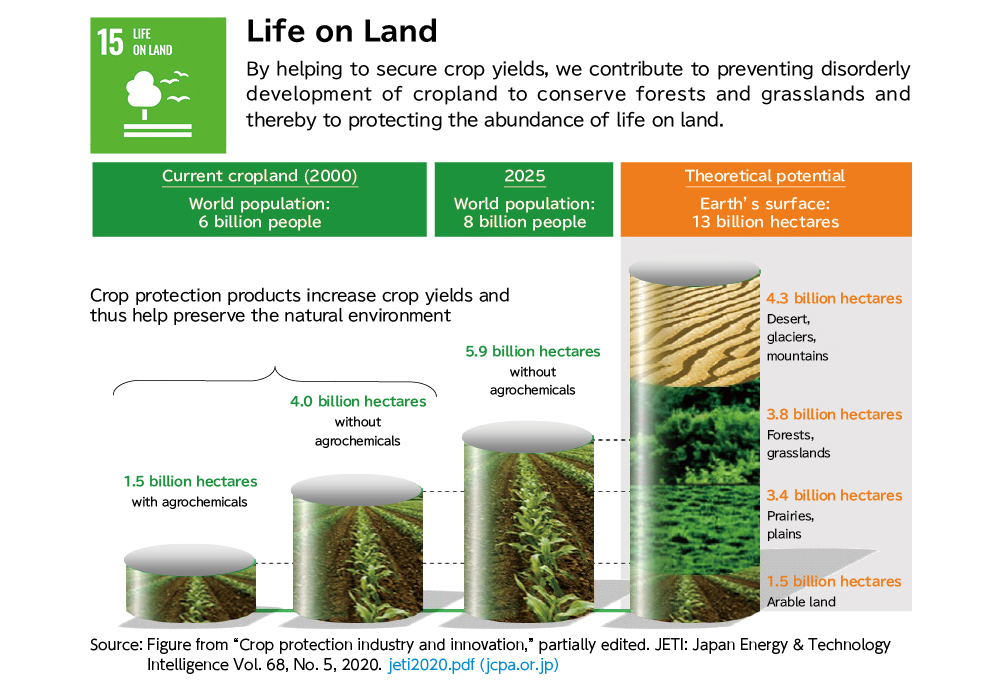
The Japan Crop Protection Association, of which the Group is a member, explains in its project to link its vision action with Sustainable Development Goals (SDGs) how agrochemicals help to increase crop production (yield per unit of area) and also contribute to environmental conservation.
When crops are not adequately protected with agrochemicals, it not only becomes impossible to secure sufficient crop yields, it also leads to forestland development aimed at increasing yields. Haphazard forestland development has a negative impact on climate change, so it is a serious global issue.
Securing sufficient crop yields is also drawing significant attention from the perspective of food security to address an increasing global population. To solve these issues, the Group performs exploratory and developmental research for new agrochemicals with bio-selective performance and reductions in dosage as benchmarks.


Nihon Nohyaku is a member of the Japan Chemical Industry Association’s Responsible Care (RC) Committee. In addition, the domestic Group companies Nichino Service, Nichino Ryokka, Nihon Ecotech, and AgriMart are registered as RC activities-related companies.
The Group voluntarily secures “the environment, safety and health,” publishes the results of its activities, and maintains a dialogue and communication with society regarding all processes covered by the RC activities concept, from chemical substance development and manufacturing to their logistics, use, final consumption, disposal, and recycling. In exploratory research and product development for new agrochemicals and crop aid products in particular, we have made clear our commitment to developing eco-harmonized products that give even greater consideration to environmental conservation in order to address the current emergence of global environmental problems and to meet the increasing requirements of society.
Connections between the Seven Priority Sustainability Issues and the SDGs
We compared the Group’s actual business circumstances and challenges with the core subjects in ISO26000, the international guideline on Sustainability management, and set seven priority Sustainability issues. Having defined the connections between these priority issues and the SDGs, the need to contribute to sustainable development through our business activities is always uppermost in our minds.
Raising Awareness of the SDGs, and the PDCA Cycle
Nihon Nohyaku and its group companies in Japan strive to ensure proper understanding of the SDGs among employees; efforts include producing inhouse workshop materials for employees, and offering on-demand training by the relevant officer in charge. In initiatives to address business challenges, we are targeting sustainable growth by analyzing risks and opportunities, incorporating them into the KGI and KPI targets of our EGG2 medium-term management plan and putting these targets into practice. We operate a PDCA (Plan→Do→Check→Act) cycle with regard to progress toward these targets, whereby progress is reported to and analyzed by the CSR Committee. In addition, progress in addressing business challenges is reported at financial results briefings for institutional investors presented by senior managers in person. We intend to continue steadily pursuing activities that will help to achieve the SDGs.
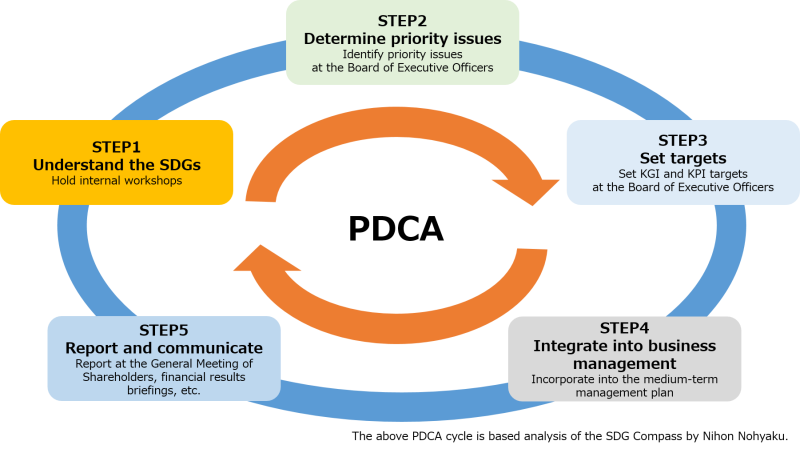
Putting the SDGs into Practice
For details of recent initiatives, click on the links below.

